




 |
   |
 |
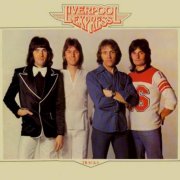 |
Tracks (1976, 39.39) *½/½ |
|
| Smile Hold Tight Never the Same Without Love You Are My Love She's a Lady Call Me Your Love It's a Beautiful Day (I Remember) Julian the Hooligan |
Rosemary Doing it All Again I'll Never Fall in Love Again Every Man Must Have a Dream |
|
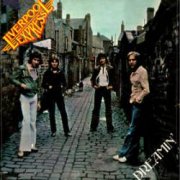 |
Dreamin' (1978, 37.37) ***/T½ |
|
| Low Profile So Here I Go Again Last Train Home Margie Songbird, Sing Your Song Little Plum's Last Stand Mary & Ann Dreamin' |
All Time Loser Don't Give Up Your Day Job |
|
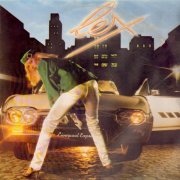 |
L.E.X. (1979, 35.46) **/TI Want Nobody But YouTake it Easy With My Heart When My Boat Comes in Last Train Home Is Your Love in Vain Sharing You Games People Play Motel Maria What a Fool I've Been |
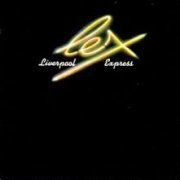 |
7" (1979) **/T½ I Want Nobody But You You Lied, I Cried |
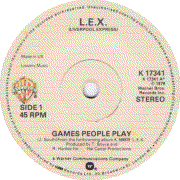 |
7" (1979) **/½ Games People Play Don't You Knock Upon My Door |
Current availability:
Mellotron used:
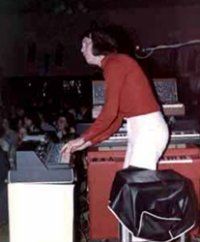 |
Oh dear. Mid-'70s UK mainstream pop, anyone? Liverpool Express were formed by ex-Merseybeat Billy Kinsley, with the express (sorry) intention of writing successful pop songs. Their debut, 1976's appalling-titled Tracks, is pretty awful, if truth be told; schmaltzy ballads, light pop, maudlin dirges, they covered all bases. A couple of tracks on side two up the tempo slightly, but they soon slip back into familiar patterns of behaviour. I thought I recognised You Are My Love; it was their biggest hit, although they seem to be remembered more (though not that much more) for big ballad Every Man Must Have A Dream, complete with Imagine lyrical steal.
I've been told there's Mellotron all over the album, but pretty much all I can hear is regular (credited) strings, until the distant strings on the horrid You Are My Love and a snatch of choirs here and there on the aforementioned Every Man..., apparently played by Roger Craig. Anyway, this is awful. Avoid. Incidentally, as you can see, the band owned an M400 (right), painted a strange reddish-brown colour, for no known reason, presumably used onstage to provide strings and choir, alongside the Korg PE-1000 string synth to the left of the picture. Other boards: a Wurltizer and a MiniMoog perched atop the Mellotron.
The band's second album, 1978's Dreamin', is a far less gloopy effort, although it has a sort-of mid-'70s Hollies air about it in places. Opening with the 10cc-ish Low Profile, other better tracks include the exceedingly McCartney-esque Margie, the dark Mary & Ann and, best of all, Little Plum's Last Stand, an excellent, semi-proggy instrumental that bears no relation whatsoever to anything from their debut. Four Mellotron tracks, with a descending harmony choir part on opener Low Profile, choirs on Little Plum's Last Stand, choir swells on Mary & Ann and polyphonic flutes all over the title track.
Their last album, 1979's L.E.X., sexist sleeve an' all, is a backward step, frankly, low points including the weird lyrical bent on Sharing You, sloppy closer What A Fool I've Been and, bizarrely, the bagpipe line on Games People Play. Two Mellotron tracks, with a flute line on When My Boat Comes In, one of the album's less offensive songs and a flute part running through What A Fool I've Been. It also turns up on a couple of b-sides: You Lied, I Cried (flip of I Want Nobody But You) features distant choirs and flute, harmonising with synth, while another blatant Macca-alike, Don't You Knock Upon My Door (flip of Games People Play) gives us the odd choir swell. Both a-sides are awful, incidentally. Actually, so are the b-sides.
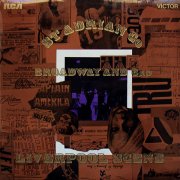 |
St. Adrian Co. Broadway & 3rd (1970, 49.11) ***/½Made in U.S.A.Human Tapeworm Night Song Bomb Commercials Colours Baby |
Current availability:
Mellotron used:
The Liverpool Scene were a 'poetry band', whose prime mover was Liverpudlian Adrian Henri; formed as a means of reaching a wider audience for their poetry, they released several LPs and were championed by fellow Liverpudlian John Peel. Their fourth (and last) album, 1970's St. Adrian Co. Broadway & 3rd, features some familiar names, not least Andy Roberts, bassist Percy Jones (Brand X, everyone), trumpeter Ian Carr (Nucleus) and Karl Jenkins (Soft Machine, soundtracks), consisting of a side-long piece, Made In U.S.A. and a side of live material. The studio side is, essentially, a cut-up, bursts of familiar tunesmithery (Mann & Weill's On Broadway, West Side Story's America) cropping up amongst the self-written parts, while the live side is probably best described as poetry set to run-of-the-mill r'n'b; I believe this stuff came across well on stage, but, in hindsight, is very much of its time.
Ian Whiteman plays keys, including Mellotron, with a handful of volume-pedalled string chords a few minutes into Made In U.S.A. I can only think of another one or two albums from the 'definite Mellotron' era to use it so minimally; suffice to say, don't bother on that account.
See: Andy Roberts
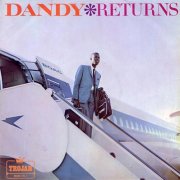 |
Dandy Returns (1968, 33.38) ***/TTT½ |
|
| Run Come Have Fun Only a Fool Breaks His Own Heart Put on Your Dancing Shoes Tribute to the Prince Yesterday The Race is on You're Not the Same Girl Your Daddy is Home |
Doctor Sure Shot It's a Sad World Musical Land My Nights Are So Lonely |
|
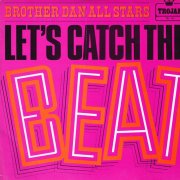 |
Let's Catch the Beat [as Brother Dan All Stars] (1969, 33.01) ***/TT |
|
| Mellow Music One More Dance (All I Have to Do is) Dream Lee's Farewell Life Can Be Beautiful Sincerely Since I Met You Baby Freedom |
Everynight The Bunk Everybody Feel Good You Don't Know |
|
Current availability:
Mellotrons used:
 |
The name Dandy Livingstone digs up a vestigial memory for me; as a youngster, I remember liking his major 1972 British hit Suzanne Beware Of The Devil at the time, although I doubt if I've heard it since or whether I'd be that impressed with it now [n.b. I just have and I'm not]. Having emigrated to the UK in his teens, Robert "Dandy" Livingstone Thompson's career began in 1964 with a lengthy run of singles, releasing his first album three years later. 1968's Dandy Returns was his third long-player, continuing the pop-reggae style that had already made him a minor star, although it sounds rather dated now, particularly in comparison with Bob Marley's political firebrand-reggae style of the forthcoming decade. T.J. Brown (I believe) plays MkII Mellotron, with strings on all highlighted tracks above (including Yesterday, one of the earlier versions of allegedly the most-covered song ever), excepting the MkII organ on Tribute To The Prince and Musical Land and something indefinable (guitar?) on Doctor Sure Shot. I can't say the Mellotron use is that exciting overall, although it's interesting to hear 'Hammond' solos performed on one, but there's certainly a lot of it, doubtless due to a limited studio budget.
Livingstone's next release, under the name the Brother Dan All Stars, was Let's Catch the Beat, later to lend its name to the 2003 two-disc Let's Catch the Beat: The Music That Launched the Legend. Essentially, more of the same, probably at its best on The Bunk, the album features three definite Mellotron tracks (presumably from Brown again), with strings on One More Dance, saxes on Freedom and upfront strings on The Bunk, although whether or not the organ on Lee's Farewell and Since I Met You Baby is Mellotronic is unclear.
See: Mr. Most | Bobby Thompson | Denzil Dennis
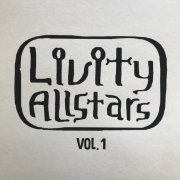 |
Livity Allstars Vol. 1 (2020, 34.53) ***/TMajestic VersionSweet Love Cosmic Response Universel Forståelse Opstand Slow Healing Cultural Horns Universal Version Tell Them |
Current availability:
Mellotron used:
According to Discogs, Livity Allstars are, "...a loosely structured studio group which is basically the Bremer/McCoy duo + friends". Their sole release (to date), 2020's Livity Allstars Vol. 1, is, essentially, a piano-infused dub album, instrumental reggae jams with the occasional actual dub trope thrown in for good measure, notably on Universel Forståelse. To be fair, this isn't like any other dub album you'll come across, so top marks for inventing a (presumably) new musical fusion!
Morten McCoy plays Mellotron (the same hire machine as used by the duo?), with an upfront flute part on Opstand; shame it didn't find its way onto another couple of tracks, really.
See: Bremer/McCoy
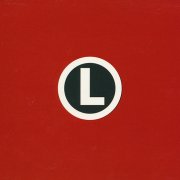 |
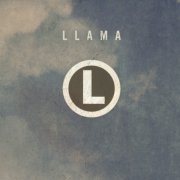 |
Llama (2005, 35.53/63.54) **½/T½ |
||
| Love New Car Alright The End Right Now Invisible It's OK Shape in the Clouds |
C'Mon C'Mon Chemical Change There [2CD reissue adds: Of the Eyes of a Deer Get the Car Northerner's Sun Smokers |
Red and Gold That You Know You Could Be Wrong Assertion of Worth Pain and Lethargy Told You So Heavy Lifting] |
||
Current availability:
Mellotron used:
I can't tell you much about Llama - it's not the most Internet-searchable name, after all - but their eponymous album crept out in 2005, being reissued, at double its original length, some ten years later, adding what seems to be a second album from 2007. To add to the confusion, the track-listing for the CD version differs slightly from the Bandcamp download, the above running order being a composite. And it's...? Typical US indie of the early 2000s, essentially, better tracks including New Car and There.
Frontman Rusty Willoughby and Scott Sutherland play what sounds like real Mellotron, with heavily pitchbent cellos on New Car (via a pitch-shifting pedal?), volume-pedalled choir chords on It's OK, string and flute lines on There and strings on 2007 track Pain And Lethargy. Not the most exciting thing you'll hear all year, then, but some nice Mellotron work.
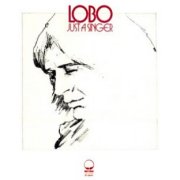 |
Just a Singer (1974, 32.49) **½/T |
|
| Rings The Shelter of Your Eyes I'm Only Sleeping Daydream Believer Reason to Believe Armstrong Universal Soldier Let's Get Together |
Lodi All for the Love of a Girl |
|
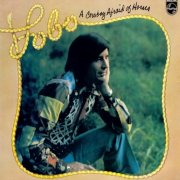 |
A Cowboy Afraid of Horses (1975, 36.22) **½/TT |
|
| Would I Still Have You The War to End All Wars My Momma Had Soul Three Pick-Ups Morning Sun Don't Tell Me Goodnight A Cowboy Afraid of Horses Then I Met You |
Something to See Me Through Thinking of You Everyday is My Way However... |
|
Current availability:
Mellotrons used:
Roland Kent "Lobo" Lavoie's solo career kicked off in 1969, his first major hit, Me And You And A Dog Named Boo, appearing two years later. By 1974, he was a well-established artist, Just a Singer being his fourth album and his first to contain covers, not least The Beatles' I'm Only Sleeping, The Monkees' Daydream Believer and Buffy Sainte-Marie's Universal Soldier (popularised by Donovan). The arrangements are in that kind of country/MOR singer-songwriter style that was immensely popular at the time, particularly in the States, but sounds horribly dated now. Alan Lindgren (Neil Diamond and Jim Stafford, amongst others) plays Mellotron flutes on Daydream Believer and Reason To Believe (not that it's going to make you warm to this record), although the strings all appear to be real.
Lobo followed up with A Cowboy Afraid of Horses the following year; it's a slightly less insipid record, or maybe I'm just getting used to his style. I wouldn't swear that all the material's his own, but I can't say I recognise any of the titles. This time round, they appear to've saved their strings budget and given a bit of it to Lindgren again, smothering the album in carefully arranged Mellotron strings, only just discernable from Just a Singer's real ones. Strings on all the highlighted tracks above, plus flutes on Something To See Me Through and phased strings on Everyday Is My Way, not to mention a raucous synth part on My Momma Had Soul.
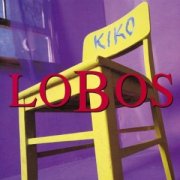 |
Kiko (1992, 51.30) ***/½ |
|
| Dream in Blue Wake Up Dolores Angels With Dirty Faces That Train Don't Stop Here Kiko and the Lavender Moon Saint Behind the Glass Reva's House When the Circus Comes |
Arizona Skies Short Side of Nothing Two Janes Wicked Rain Whiskey Trail Just a Man Peace Rio de Tenampa |
|
Current availability:
Chamberlin used:
I'm stunned to discover that Los Lobos released their first album in 1976; given their late-'80s long-deserved rise to fame, that's the era in which they tend to find themselves placed, so it's startling to learn that they were probably all already in their thirties by then... Said first album, Si Se Puede!, is probably almost impossible to find now, having seemingly never been reissued, but their eighth, Kiko, can be picked up anywhere, given how well it sold. I've seen it described as 'wildly experimental', but that's clearly down to the observer's point of view; I see it as a nicely diverse Latin pop/rock album, pulling in soul, r'n'b, rock'n'roll, psych and even mariachi influences, making for a potent East L.A. gumbo of styles that shouldn't offend anyone who recognises quality songwriting, or appreciates a good production job.
Producer Mitchell Froom, presumably, puts some Chamby flutes down on Just A Man, but so quietly you could easily miss them. Froom's notorious for getting one of his M1s on pretty much everything he produced at the time, although he tired of them later, so I'm sure there's a few of his productions I've missed. So; not an album I'll play that often, but one that's pleasingly different, not only to pretty much everyone else, but even within its own virtual grooves, although its tape-replay content is typically Froomianly low.
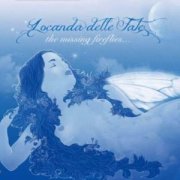 |
The Missing Fireflies (2012, 35.00) ****/TT½CrescendoSequenza Circolare La Giostra Non Chiudere a Chiave le Stelle Non Chiudere a Chiave le Stelle (live) Crescendo (live) Vendesi Saggezza (live) |
Current availability:
Mellotron used:
Locanda delle Fate are yet another Italian prog one-off, their sole album in their original incarnation, 1977's gorgeous, symphonic Forse le Lucciole Non Si Amano Più (****½), being one of the very best 'late period' progressive albums from any country. After the archive Live (an official release of a radio broadcast recording), they reformed briefly in the late '90s, releasing the mostly woeful and best-forgotten Homo Hominis Lupus (**½), before crawling back under their stone for a decade.
2012 brings the fruits of the band's third go at this recognition lark, The Missing Fireflies, recorded by a six-piece lineup containing four (of seven) original members. Unlike its unfortunate predecessor, the album's contents are either new recordings of old, mostly unrecorded material, or archive live recordings, leading to an odd situation whereby Non Chiudere A Chiave Le Stelle, originally found on both Forse le Lucciole... and Live, is present here in yet another two versions. The studio recordings (the first four tracks) are superb, giving us two entirely unheard pieces (Crescendo and Sequenza Circolare, a piano solo) and, at last, a decent recording of Live's La Giostra, alongside the slightly pointless re-re-re-recording of Non Chiudere... The live material's good, too, as you'd expect, featuring an 'original lineup' version of Crescendo and the original album's Vendesi Saggezza, although the latter fades out, irritatingly.
The band sourced a genuine M400 for the recording (although I believe they had to travel to another studio to use it), played by Oscar Mazzoglio and Maurizio Muha, with strings on Crescendo, La Giostra (plus choirs) and Non Chiudere A Chiave Le Stelle. No, the original band didn't use a Mellotron, but listening to how seamlessly they integrate it into their sound here, I suspect that had as much to do with availability and its tragic-yet-inevitable late '70s slide into irrelevance as a lack of desire to use one. All in all, a slightly fragmented, yet beautiful album that will appeal not only to fans of their '70s work, but to anyone wishing to hear lashings of genuine Mellotron on some great, previously-unheard material from the era.
 |
Transfert (1978, 32.31) ****/TT½Le CrieurClair-Obscur Matinale Suite Matinale Transfert Reel à Maryse |
Current availability:
Mellotron used:
Serge Locat was keys man with the mighty Harmonium, who I believe were in their (amicable) death throes when Transfert appeared. Lush, instrumental symphonic keyboard-led prog is the order of the day here, synth melodies to the fore, although Matinale and Suite Matinale cross the line into piano balladry, nearer instrumental Billy Joel than progressive rock. Apart from Harmonium themselves, Genesis are a prime influence, being one of the most popular international progressive outfits in Québec in the '70s, although much of the album's sound can be attributed to late-19th century composers such as Mahler, also influencing The Enid around the same time.
Locat plays Mellotron choir extensively on Clair-Obscur, with lesser use on the title track and Reel À Maryse, although the strings on the wonderful Transfert are synthesized. I'm not sure if I can actually recommend this as a Mellotron Album, but the two middle tracks aside, it's very much worth hearing, assuming you can ever find a copy.
See: Harmonium
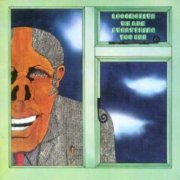 |
We Are Everything You See (1970, 41.14) ***½/T |
||
| Overture Mr. Armageddon Now is the End - The End is When Lay Me Down Gently Nobody Asked You to Come You Must Be Joking A Day in Shining Armour The Loves of Augustus Abbey Part One |
Rain The Loves of Augustus Abbey Part Two Coming Down/Love Song for the Dead Ché The Loves of Augustus Abbey Part Three Time of Light and Darkness |
||
Current availability:
Mellotron used:
After a couple of ska hits (!), the Birmingham-based Locomotive went all progressiveish, loike, for their sole album, 1970's We Are Everything You See. Vocalist/organist Norman Haines (later of the, er, Norman Haines Band, whose sole album is a classic) lets rip on the Hammond all the way across the record; although the songwriting falters in places, the end result is an unfairly overlooked late-period psych release. The band were managed by their ex-trumpeter, Jim Simpson, who had quite a stable of Brummie bands, not least Black Sabbath, who even recorded one of Haines' songs for their debut, only to ditch it in favour of the material we know and love. Locomotive's unusual lineup of keyboards, bass, drums, trumpet and sax makes them stand out from the pack on the psych reissue front, giving them an edge over the standard guitar-led format, the only audible guitar (player unknown) being on one of the CD's bonus tracks, Roll Over Mary.
Haines plays Mellotron on two tracks, with something unidentifiable (one of the brass variants?) on A Day In Shining Armour (ho ho), with a couple of seconds of strings at the end and some excellent pitchbent strings (MkIIs were better at this) on closer Time Of Light And Darkness. Nothing on the bonus tracks, either, so not enough use to consider this in any way a Mellotron Album. It's worth hearing in its own right, however, although the era did produce better records. Not bad, not brilliant.
See: Dog That Bit People
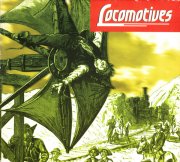 |
Spin (1997, 46.13) **½/T½ |
|
| Flamenco Mind Rainbow Once I Loved Bonzai Dog Flintstones Texas |
Fallin Rose Spin [Untitled] |
|
Current availability:
Mellotron used:
Locomotives' first album, 1997's Spin, is Norwegian alt.rock, '90s-style, at its least generic on the skronky Rainbow, the ancient drum machine-driven Once I Loved and Fallin, maybe, although this is an album firmly wedged into the era of its birth.
Producer Kåre Chr(istoffer) Vestrheim is credited with Mellotron on three tracks, with background strings on opener Flamenco, chordal flutes on Once I Loved and shrieky strings on the title track, while vocalist Hans Jørgen Støp adds flutes (and an unidentified woodwind?) to Fallin. I was going to chuck this into 'samples' until the end of Spin itself, where the machine grinds to a halt in a most authentic fashion. Shame it doesn't improve the album. Locomotives made another couple of full-lengthers, then quietly disappeared around the turn of the millennium.
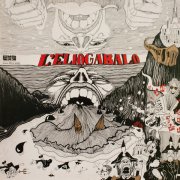 |
L'Eliogabalo (1977, 41.54) ***½/TT |
|
| Monologo d'Apertura Tutto Quello Che Mi e Stato Tolto lo Rivoglio La Veglia Autoritratto Dentro Stanze Elettroniche Giovanna Labbromorto Il Viaggio A Scaldarci al Vino Dolce dei Chilometri Dal Finestrino del Treno La Ferrovia Celeste |
La Visione La Primavera Feroce La Scelta di Essere Veramente Liberi Eliogabalo Imperatore La Gente in Strada L'Attesa La Morte di Eliogabalo Avvertenze - Finalino per Altri Inizi |
|
Current availability:
Mellotron used:
Sicilian actor Emilio Locurcio released just the one album, 1977's L'Eliogabalo, an Italian-language concept effort, subject unknown. Against all the odds (actor makes album, late '70s Italy, other borderline Italian prog singer-songwriters), it's really rather good, at its best on Il Viaggio and two-part closer L'Attesa, nothing here triggering the twitching finger held over the 'next' button, despite the occasional musical theatre trope.
Pierrot Lunaire's Gaio Chiocchio plays Mellotron (although he never used one with his own band), with choirs, vibes and background strings on the first part of La Veglia, Autoritratto Dentro Stanze Elettroniche, flutes and choirs on the second part of Il Viaggio, Dal Finestrino Del Treno, strings, sometimes pitchbent, on part three, La Ferrovia Celeste and flutes on part three of La Visione, Eliogabalo Imperatore. Less Mellotron use than it may appear from the tracklist above, but an album worth hearing for the Italian prog fan who thinks they've heard it all.
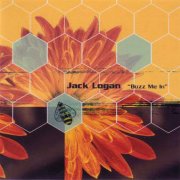 |
Buzz Me in (1999, 42.28) ***/½ |
|
| I Brake for God All Grown Up Hit or Miss Melancholy Girl Wordly Possessions Anytime Metropolis Glorious World |
Diving Deeper The Possibilities Pearl of Them All Weren't Gone Long Gimme a Room Ordinary Person |
|
Current availability:
Mellotron used:
Originally better-known as a visual artist, Jack Logan's been around since the mid-'90s, presumably peddling the same brand of thoughtful Americana you can hear on his fifth album, '99's Buzz Me in. It seems his first four releases were all very much home-made, but this time round he used a slew of sessioneers, fleshing his sound out to that of a full band. Highlights? The punchy All Grown Up, Metropolis, the powerpop of Glorious World and Pearl Of Them All, maybe.
Phil Hadaway is credited with a variety of instruments on three tracks, but the only one to contain any Mellotron is Worldly Possessions, a string line dipping in and out of the mix. No, we don't get much of it, but it sounds real, which makes a nice change.
Gotta love his late '90s-style official site...
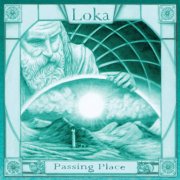 |
Passing Place (2011, 49.46) ***/TT |
|
| Entrance As the Tower Falls The Tower The Art of Burning Bridges Sam Star The Beauty in Darkness Temporary External The Sound Stars Make |
Attrition Exposed No Water Mirror Image Opposite Exit |
|
Current availability:
Mellotron used:
Liverpool's Loka are extremely difficult to categorise, which is probably exactly as they like it. 2011's Passing Place (their second release) shifts between a multitude of styles, not least muted electronica (opener Entrance, The Art Of Burning Bridges), a very British form of orchestral funk (As The Tower Falls) and despairing instrumental piano balladry (The Sound Stars Make), most of the remainder falling (further) into the 'sounds like little else' non-category. The album was recorded at Thighpaulsandra's studio, who also co-produced and wrote the muted brass arrangements that characterise the album so much, lending it a quiet, solitary beauty.
Mark Kyriacou plays most of the credited Mellotron parts (Thighpaulsandra's machine?), with Catherine Norman on The Sound Stars Make. Little of it is overt, with either background strings or nothing audible on all highlighted tracks, bar Sam Star (more obvious strings) and flutes on Mirror Image Opposite. Quoting Thighpaulsandra's music as a reference point is lazy and largely inaccurate, but it's difficult to know just how else to describe this. Not really worth it for the Mellotron, but nice to hear it used.
See: Thighpaulsandra
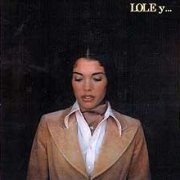 |
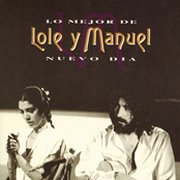 |
Nuevo Dia (1975, 42.29) ***/T½ |
|
| Nuevo Dia Tangos Canasteros Bulerías de la Luna Un Cuento Para Mi Niño La Plazuela y el Tardón El Río de Mi Sevilla Todo es de Color Por Primera Vez |
Con Hojas de Menta Sangre Gitana y Mora |
||
Current availability:
Mellotron used:
Lole y Manuel were Dolores Montoya Rodríguez and Manuel Molina Jiménez, apparently the first flamenco duo to bring their music to a wider, pop audience. 1975's Nuevo Dia is a perfectly respectable album with some beautiful dual guitar work in places, although Lole's voice can be a bit shrill at times. Interestingly, you can hear her country's Moorish influence on her vocal lines, although the melodies are Europeanised enough to not be mistaken for Arabic ones.
Granada's Carlos Cárcamo plays Mellotron, with uncredited cellos and strings on the title track and closer Sangre Gitana Y Mora and credited cellos on Todo Es De Color, good to hear, but not what you'd call essential. This is actually available on CD, but I wouldn't really recommend it to any except flamenco lovers and it really isn't worth it for the Mellotron. Incidentally, Marcos Mantero's credited 'Mellotron' on the following year's surprisingly decent, prog-flecked Pasaje del Agua (***½), is nothing more than string synth.
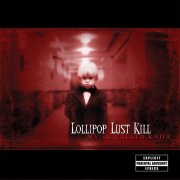 |
My So Called Knife (2002, 48.20) **½/½ |
|
| The Open Door (Intro) Black All Over Like a Disease Father Knee Deep in the Dead Everything I Sad Excuse for a Grip Perfect Woman |
Bury You Personal Jesus Can't Get Away Kill Greedy No Answer (Outro) |
|
Current availability:
Mellotron used:
Lollipop Lust Kill are a pretty typical 'alternative metal' band, sounding not a million miles away from Korn's proto-nu-metal grind, throwing some melody into the mix every now and again. After an indie debut, 2000's Motel Murder Madness, 2002's My So Called Knife (ho ho) was their only major-label release, the band splitting in 2004. The album doesn't seem to do anything much not done as well or better by various other bands, although I'm sure aficionados of the band/genre would argue vehemently that they had an individual take on the style. Whatever.
Producer Sylvia Massy Shivy allegedly plays Mellotron on the album, but the only thing that even might be the mighty Mellotron is an unidentifiable keyboard part on Can't Get Away, that could just possibly be Mellotron strings mixed with something synthetic. Then again, they could've just decided to credit her with 'Mellotron' for no particularly good reason. Who knows. Or cares. Modern metalheads may like this record. I don't, although it gets **½ for being done fairly well. Don't bother. Really.
 |
Reboot (2012, 29.59) ***/T |
|
| When the Night Falls Pop Minute Man Every Dog Rebecca Animal Attraction Like it Never Happened Celebrity Crash |
Standing Alone Get Out of London 77 Dreams |
|
Current availability:
Mellotron used:
London? I remember them; Liverpudlian second-division punks, featuring a pre-Culture Club Jon Moss and managed by Simon Napier-Bell, of all people. They put out a rather lacklustre 12" on MCA in '77, including their take on The Easybeats' Friday On My Mind, apparently following up with an album the following year, by which time I'd lost interest. They split before the album's release, but fast-forward over thirty years and a new lineup appears, led by two original members, one-time BBC comedy writer vocalist Miles "Riff Regan" Tredinnick and bassist Steve Voice, releasing the authentically skronky Reboot in 2012. It's not a bad effort within its 'still second division' limitations, sounding like it could've been their later-in-'78 follow-up, shifting between punkier material (Minute Man, Like It Never Happened, Celebrity Crash) and a more powerpop sound (Animal Attraction, Every Dog, the latter featuring a chord sequence straight out of Eddie & the Hot Rods' eternal Do Anything You Wanna Do).
Guitarist Hugh O'Donnell plays Mellotron strings on the album's ballad, Standing Alone, that might even be real, although the increasing sophistication (read: authentic distortion) of sample-sets makes it harder and harder to tell. Anyway, you're hardly going to buy this for its relatively minimal Mellotron use, I suspect. What did The Exploited once say? Oh yeah: Punks Not Dead, given a presumably unintentional double-meaning by its lack of punctuation.
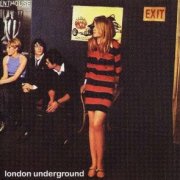 |
London Underground (2000, 37.08) ***½/TTKultual Opus #1Magda K. Worst is Yet to Come Squadron Leader Everywhere I Go Mass Baptizer Was She Worth My Time Love is a Beautiful Thing Watcha Gonna Do |
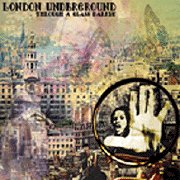 |
Through a Glass Darkly (2003, 47.29) ***½/½ |
|
| End of the Race Travelling Lady Sermonette The Days of Man Analonihum A Beautiful Child Through a Glass Darkly Cryptical Purple Browne Orcharde |
Can't Find the Reason Everything is Coming to an End Another Rude Awakening |
|
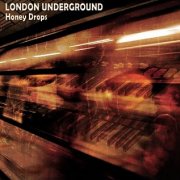 |
Honey Drops (2010, 53.37) ****/TT½ |
|
| Fanfare Ellis Island Jive Samba Honey Drops Midnight Cowboy Faster and Faster Dharma for One Queen Saint-Gang |
Saint-Helens Norwegian Wood Waiting for the Lady Jive Samba (radio edit) |
|
 |
Four (2018, 55.53) ****/TT |
|
| Billy Silver Ray Ban At Home The Comete What I Say Tree Job Man Tropic of Capricorn Jam |
Mercy, Mercy, Mercy Bumpin' on Sunset |
|
Current availability:
Mellotrons used:
Italians London Underground impressed me immediately with their foreign-language pun; well, can you pun in Italian? They chose the name as they 'play the kind of music that was heard on the London Underground in the late '60s'; I can only assume they're referring to Ladbroke Grove, rather than the actual underground... Anyway, the band evolved from much-missed Mellotronlords Standarte; their eponymous debut appeared in 2000, sitting defiantly in the late-period psych camp at the point where the style morphed into proto-prog, somewhere around 1970. About the only real giveaway is that the distorted guitar sound is possibly too smooth for the time, if that isn't a non-sequitur. Decent material throughout, particularly Worst Is Yet To Come and the Hammond-heavy Squadron Leader. Gianluca Gerlini plays Mellotron, with background strings on Magda K., cellos, strings and brass on Worst Is Yet To Come and strings and flutes on Mass Baptizer, although the strings on Was She Worth My Time sound too real to be Mellotronic.
They followed up with 2003's Through a Glass Darkly, not dissimilar in style to its predecessor, shifting from the full-on psych-rock of End Of The Race and Cryptical Purple Browne Orcharde to the laid-back dreamy psych of Analonihum and the title track. Disappointingly, very little Mellotron this time round, just a brief string part on closer Another Rude Awakening from Gerlini again, his chief keyboard input being his sterling work on the Hammond, bits of acoustic piano and Wurly thrown in.
Seven years is long enough to make you think the band had gone the way of all things, only to be proven wrong by 2010's excellent Honey Drops, an album largely consisting of covers of late '60s-to-early '70s material, plus a handful of band originals. The covers include Fanfare (The Crazy World of Arthur Brown), Brian Auger's Ellis Island, the band's take on the oft-covered Norwegian Wood, Uriel's Queen St. Gang, Jethro Tull's Dharma For One and a great version of John Barry's iconic theme to Midnight Cowboy. It tears along at a good old pace, in the band's tried-and-tested Hammond-heavy freakbeat/psych style, this time shunted over the border into about 1972, like the soundtrack to an extended party scene in a long-lost exploitation flick from the era. Although bandleader Gerlini plays Hammond, the Mellotron parts are covered by Sergio Taglioni (who briefly played with The Watch), with a brief, dirty burst of grungy choir on Fanfare, opening the album, background strings on Jive Samba and upfront ones on the title track and Midnight Cowboy, finishing with a minor cheat, a repeat of Jive Samba in 'radio edit' form.
After another interminable wait, 2018's imaginatively-titled Four really delivers the goods, without really changing anything. Well, if it ain't broke... If anything, even more stoned-out Hammond grooves this time round, at their best on the rip-roaring At Home, What I Say, Tree Job Man, Jam... Despite a slow start this album kills; who'd have thought they'd produce their best work so far into their career? Gerlini's back on Mellotron, with string section (or chordal cellos?) on At Home, What I Say and closer Bumpin' On Sunset and cellos on Tree Job Man, at least as far as I can tell.
See: Standarte
 |
Wild River (2004, 55.55) **½/T½ |
|
| Always Honey Trap Mandy About Time Vertigo Loving and Giving Wild River This House |
In Essence Joely Falling Down On to the Headland |
|
Current availability:
Mellotron used:
David Longdon's Wild River appeared several years before he joined Big Big Train for 2009's The Underfall Yard. It's probably best described as a progressive pop album as written by an old-school singer-songwriter, at its best on Loving And Giving and the vocal work on the title track. Sadly, too many tracks on this overlong album stray closer to borderline adult contemporary than they should; an edited version with the smooth edges roughened up might be a better listen.
XTC's Dave Gregory plays Mellotron, with flute flurries on Honey Trap, chordal strings (underneath real fiddle) on About Time and strings on Falling Down, none of it that overt, but nice to hear. As a sad postscript, Longdon died in late 2021, after an accident at home.
See: Big Big Train
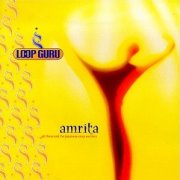 |
Amrita... All These & the Japanese Soup Warriors (1995, 70.29) **½/T½ |
|
| Sheikh Yayli Diwana Soulus Papasus Often Again Sun Epic Song |
Gianyar Fumi Planeshift - Mata Amritanandamayi |
|
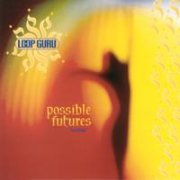 |
Possible Futures: Fourplay (1995, 21.25) **½/TTYayli (Deptford monkey chant mix)Papasus (the Original Demon) Skin The New Look of Landscape Gardening |
Current availability:
Mellotrons used:
Loop Guru are a British 'worldbeat' outfit, which breaks down to 'ambient trancey stuff with a bit of 'world' thrown in', for what it's worth. 1995's Amrita... All These & the Japanese Soup Warriors is their third album; while a few tracks of this stuff are probably fine as background music, if you don't object to the rhythms too strongly, seventy blasted minutes of it is enough to drive one loopy. Ahem. I'm sure this stuff has been used as incidental music on TV - it's almost too obvious not to, really, but I'd hardly recommend it as a 'good listen'. Often Again features a full-on Mellotron flute part right through the track from an unknown player, while Gianyar sticks some in near the end, sounding reasonably real, although it is the easiest Mellotron sound to sample.
The same year's Possible Futures: Fourplay contains three 'typical' Loop Guru tracks, ending with the odd man out, The New Look Of Landscape Gardening. Because? It's essentially a (clearly real) Mellotron flute solo piece, only slightly spoiled by the background-yet-pervasive programmed 'tribal' rhythm running all the way through. Six mins forty-four secs of polyphonic Mellotron playing is enough to garner this a clear two Ts for one track, though.